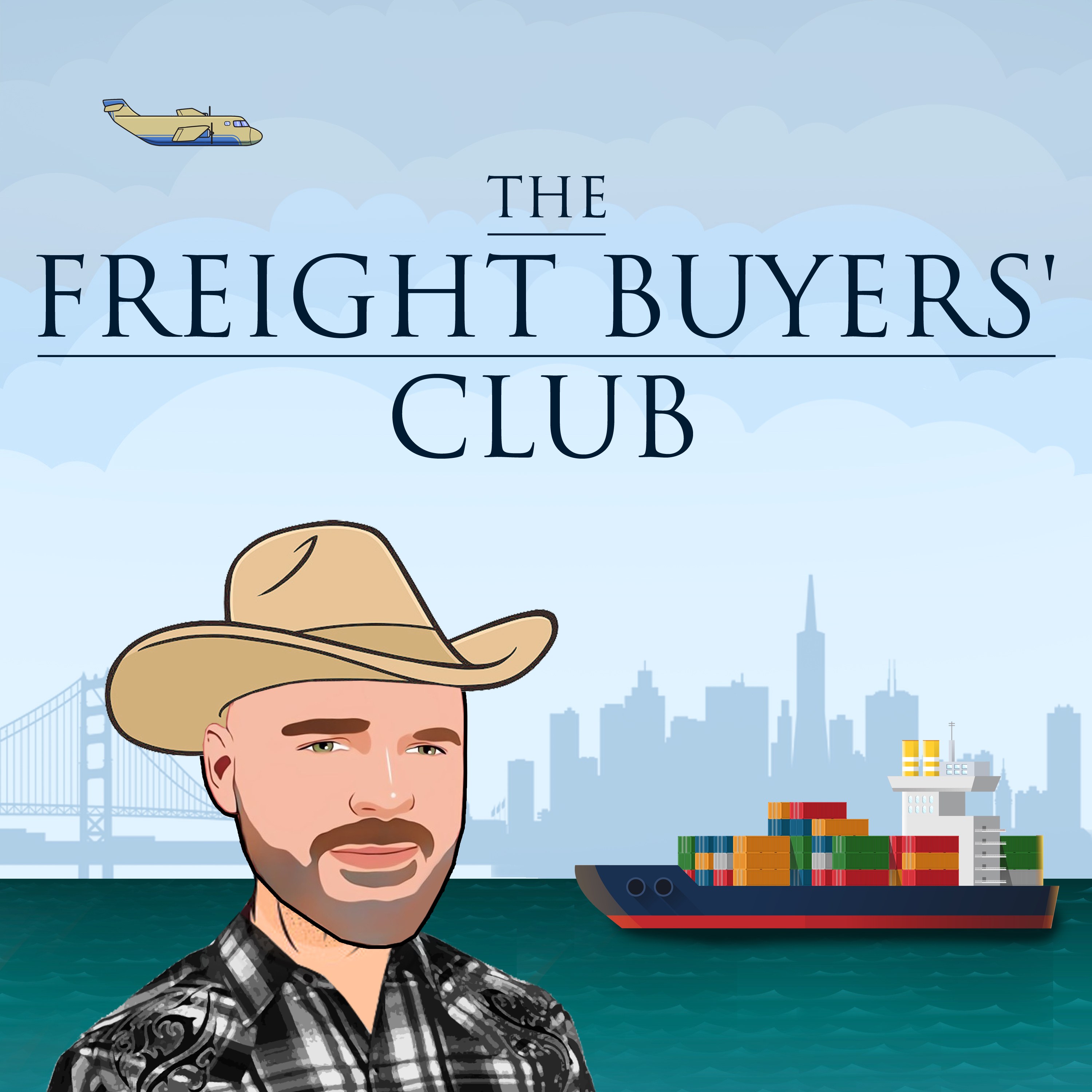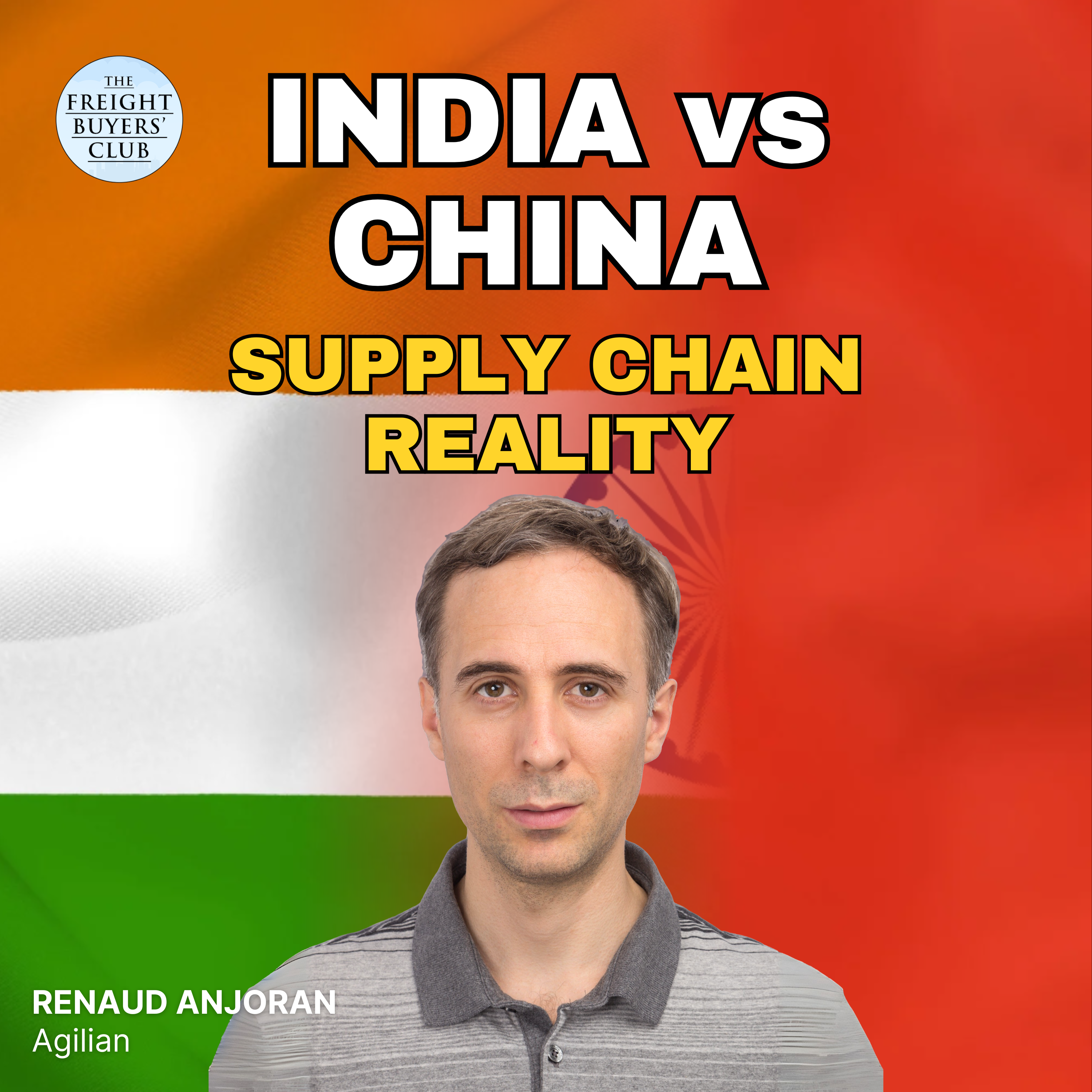Episode Transcript
[00:00:03] Speaker A: Hello everybody. Welcome to the Freight Buyers Club. This episode is sponsored by Domeco Express Group and I'm joined now from Florida in fact by the president of the Global Shippers Association, Mark Chadwick. Welcome.
[00:00:16] Speaker B: It's great to be with you Mike. Thanks for inviting me.
[00:00:19] Speaker A: Thanks for coming on. Mark. I know you're very busy at the moment trying to cope with all this flux in the world.
Two things to start. Firstly, how have you been coping this year with US tariff policy?
And secondly, what are your early thoughts on the US China tariff 90 day truce that we've seen?
[00:00:43] Speaker B: So the Chilk Global Ships Associates, 22 members, Big Global companies, everything from appliances to wind turbines.
So very diverse mix of products. But I mean the general theme. A lot of the shippers have been holding back volume, waiting to see what would happen. You know, we know we need to bring stuff in but there's definitely some pent up demand which is now going to hit like tidal wave for all kinds of shippers. But I think if this had gone on another month that would be much worse. We're going to see a lot of disruption, we're going to see trouble, empty containers being in the wrong places, we're going to see congestion of the ports, that kind of thing. But had this gone another four weeks or five weeks it would have been much worse. So hopefully we can weather this storm like we've weathered the others and we'll get through it.
The fact that it came so quickly is definitely a blessing and a surprise. I mean it was a surprise to go to such a high tariff in the first place with China come down now to 30% or so.
I think the way most of us should perceive this, 30% is something that is probably going to be around for longer than the 90 days. I mean, who knows, anything could happen. But I think you've got to build your business plans based on what we know. And right now that's 30%.
[00:02:07] Speaker A: So a tidal wave.
What happens next is you're saying is everyone's going to move as much as they can. Is this predicated on the basis that you think or you have to imagine that maybe something worse could happen in 90 days or you just don't know?
[00:02:23] Speaker B: Well, I think it's not just that. I think it's more the pent up demand. So inventures have been running down to a point where it wasn't going to be sustained much longer. So there's going to be a flood of that demand that's been pent up, that needs to be shipped. It's all going to hit at the same time this week. People are going to be booking like crazy over the next couple of weeks. You probably see some factories that have been furloughed get back up and running and start to produce.
I don't think, I mean who knows, I don't think that many shippers are worried that we could go back to over 30% in 90 days from now.
You know, 30% is probably, we would hope is the ceiling. You know, things can only get better. Who knows, right? Anything could happen. But I think that'll be the plan is it won't get much worse than that hopefully. But you know, there's just so much demand now and it's going to, it's going to kick in as well with peak season for ocean shipping over the summer months. So all that's going to come together and I think it's going to be tough in a few weeks time when all these ships start at the US Ports, we're going to see congestion, spot rates are going to escalate. People will panic about that and start pulling in stuff even earlier because of the risk of escalating rates. So yeah, it's going to be a tough few months, I would think.
[00:03:44] Speaker A: So you're predicting an early ocean container shipping peak season this year. What's your freight buying strategy around that, if I might ask?
[00:03:53] Speaker B: So we typically, and we do the same for every we contract for a year. We prefer to have most of our volumes. Probably about 80% of our volume is contract rates that are fixed throughout the year with with no peak season surcharges. So we tend to weather the storm pretty well when spot market dips very low. It might be slightly below our contract risk but for the most part we're way below what the spot market is. So we'll stick to that strategy. I think it's going to be really important to maximize that partnership that we've built with the ocean carriers over time.
They hold the keys to the capacity now. So having that kind of good relationship with them is going to be really important going forward and hopefully they'll remember that and they'll keep loading our containers for the rest of the year. And I'm sure they will.
[00:04:41] Speaker A: Mark, I'm sure you've spent the last 24 hours getting on top of all this speaking to your carrier partners. What are they telling you that they're doing?
[00:04:50] Speaker B: So you know, I think they were salivating the prospect of this happening. Obviously it's good for them, right? I mean this will be rates that were Going down will certainly start going the other way. And what I've been told by the ones that are really good partners and that the big ones are certainly partners of ours, is that they congratulate us on locking in our contract, our MQCs already last month because they're sold out. So they're going to keep loading our freight, but they're not going to load more than they have to. They're going to load what we've committed to ship and then spot market is going to be where they make some real money again this year. Last year they had Suez and the spike of that caused. This will be the thing this year that helps carriers make billions of dollars again.
[00:05:36] Speaker A: Mark, you represent some of the biggest shippers globally, of course. Have you got a message for policymakers, particularly policymakers in the US in terms of what you would like to happen over the rest of the year?
I'm assuming less disruption, more certainty would be good things.
[00:05:54] Speaker B: Yeah, stability is obviously is key for any kind of business. The fact that you, you know, at the beginning of last week we were still hearing there weren't even talks between the US and China. And then by Friday, oh, there were talks that have been very quick and they've gone well and we've already got the, you know, kind of a solution. So more stability if there needs to be trade actions, which, you know, there's some justification in some of this stuff for it not to be against the whole world all at the same time. I mean let's pick our battles and knock these out one by one.
But yeah, just stability. Hopefully we're seeing de escalation a little bit now. India, Pakistan seems to be settling a little bit. Suez Canal, what will happen there? I think carriers are going to be slow to want to go back through the Suez, so that probably won't happen too much later in the year. But just stability, less of these knee jerk kind of policy reactions. And it's just not good for the economy of any of the countries that.
[00:06:51] Speaker A: Are involved in terms of long term planning for supply chains, for procurement. This tariff war and all this disruption around it, is that preventing people from making long term decisions in terms of what they might or where they might procure from in the future? Whether that's reshoring, is it near shoring anything but China?
Is there just too much uncertainty to make a call on any of this at the moment?
[00:07:16] Speaker B: Yeah, I think there's so much uncertainty. If you'd have started that plan a month ago. Look, we can't live with 135, 140% of let's move to Country X. And now you see this happen, you rip up those plans and start again.
There was already a movement to bring manufacturing to make sense back to the US or closer was already happening. We saw that with GE Appliances.
They were bought by a Chinese company, but they've actually invested a lot in Louisville, Kentucky, and we have much bigger production there for that shipper than we did 10 years ago. So where it makes sense, that's already happening. But there's just certain things. We're not going to be making the $5T shirts in the US so some of this stuff is going to have to stay overseas. And China's still going to be a part with this new deal.
Yes, they're probably going to be in it for the long term.
[00:08:10] Speaker A: Mark Chadwick, president of the Global Shippers association, thanks for joining me today on the Freight Buyers Club.
[00:08:15] Speaker B: Thanks. Appreciate it, Mike. Take care.
[00:08:18] Speaker A: And big thanks also to Jamaica Express Group for supporting independent journalism. Thanks to you all for tuning in. Please do like follow and subscribe. There's a bell down there somewhere. We've now got over 4,000 subscribers, including 3,000 plus on YouTube alone. So please do hit those subscribe and like buttons. You're part of a growing community.
See you soon.


